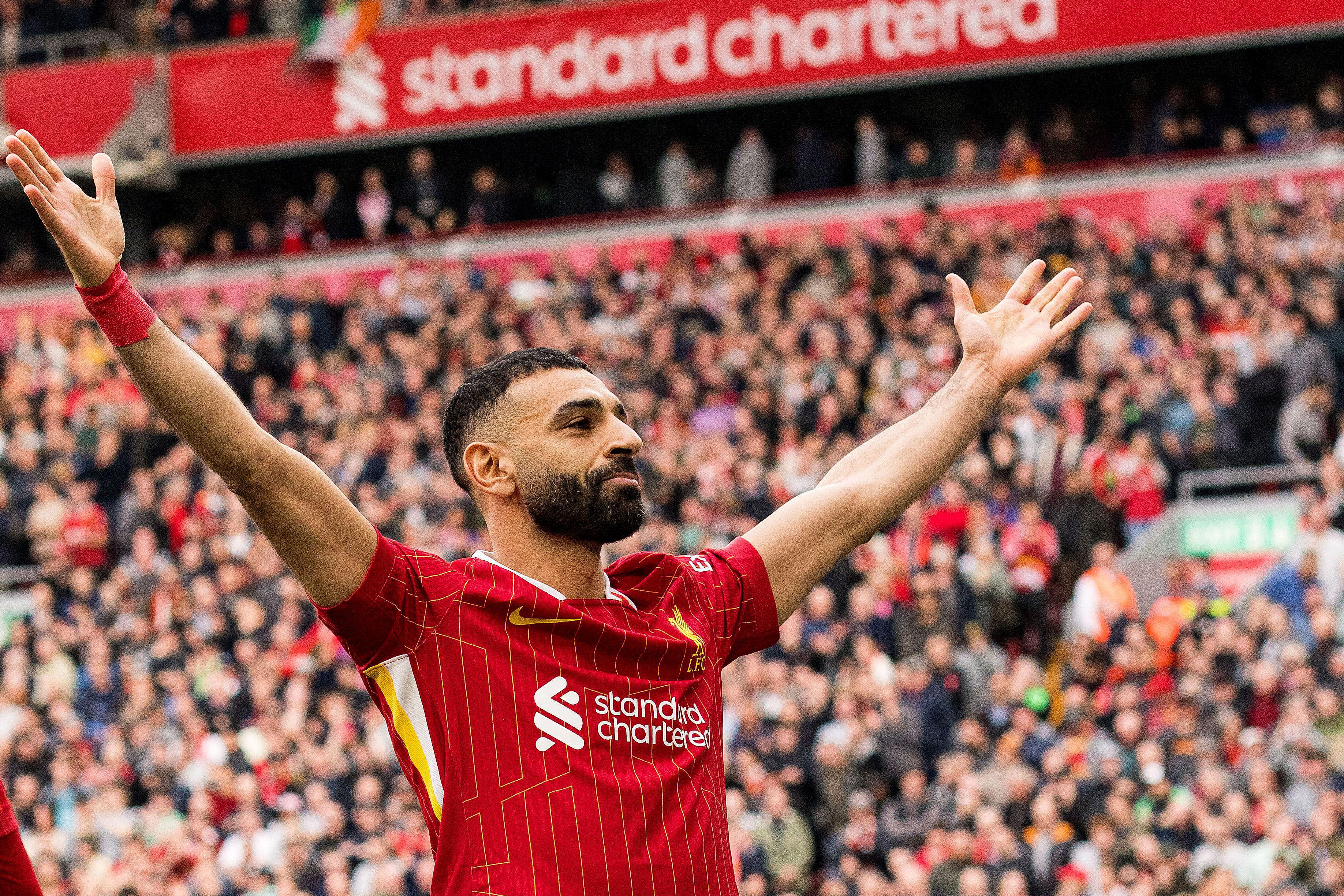The 10 best Liverpool players of the Premier League era
Seb Stafford-Bloor selects the greatest players to have represented the Merseysiders in the last 24 years
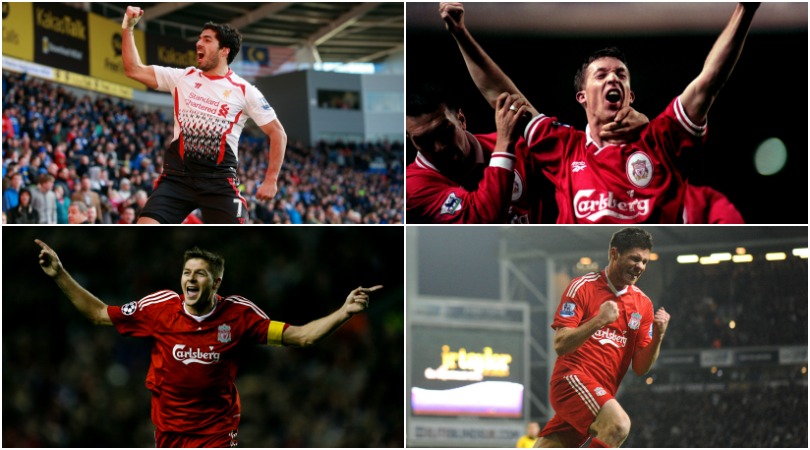
Liverpool is a special club: the icons are many and the pantheon is already full. The Premier League era has been one of near-misses and the occasional excruciating failure; as value therefore cannot be measured only in trophies, the concept of greatness is relatively abstract. Below are 10 players who were important to their team, their time and to the respective common objectives.
10. Pepe Reina
His heroics were rewarded by League and FA Cup success, and his performance against Chelsea at Anfield in 2007 took Liverpool to another European Cup final
There has to be room for a goalkeeper and Anfield has been a funny place for them over the past 24 years. David James struggled under the lights at a young age, Sander Westerveld had obvious flaws and both Jerzy Dudek and Simon Mignolet were similarly imperfect, despite the latter's attachment to Istanbul.
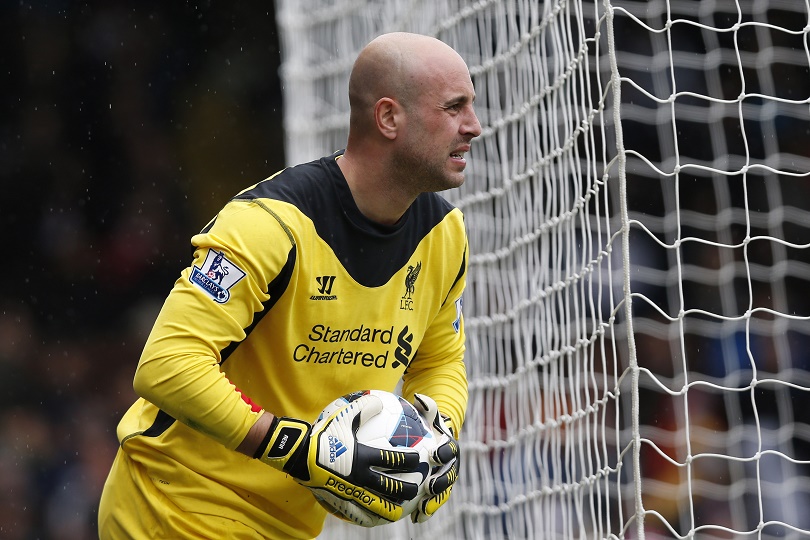
Pepe Reina made errors. Bad ones. He could, however, be excellent for long periods of time, even though he found tangible success elusive. In a FourFourTwo article from 2015, Alex Hess wrote that:
"Reina has kept goal – and done so quite brilliantly – for some of Europe’s major powerhouses. He's also been a part of some of the most medal-hoovering squads in football history. But these two things have never coincided. Call it Reina’s Law: his own excellence has largely come while playing in nearly-sides; World Cup, European Championship and, almost certainly, Bundesliga medals have been won nearly exclusively from the bench."
It's a smart summation and absolutely correct. His heroics - typically in penalty competitions - were rewarded by League and FA Cup success, and his performance against Chelsea at Anfield in 2007 took Liverpool to another European Cup final. There was, however, little to compensate him for his 285 league appearances, the majority of which helped provide his side with a defensive stability that they didn't possess before and haven't rediscovered since. He was, pur simply, a very good goalkeeper playing in a team who weren't quite good enough domestically.
9. John Barnes
Get FourFourTwo Newsletter
The best features, fun and footballing quizzes, straight to your inbox every week.
The old spirit was waning by that point, but Barnes at least gave McManaman, Robbie Fowler et al. the chance to see it for themselves
By the time the Premier League began, Barnes' best years were behind him and he'd already become a different sort of player. The slaloming runs and pace were out, possession and control were in. Barnes had spent most of his career as a dynamic focal point, but by the early 1990s that role had been deferred to emerging graduates and players who subtly benefitted from his steady, veteran influence.
Aside from his tactical function, Barnes held key responsibilities in Liverpool's dressing room. In a recent interview with Graham Hunter, Steve McManaman spoke of his importance at what had been a formative stage of his own career. Barnes had won the league title in 1987/88 and again in 1989/90 and was a survivor of a more successful era.
For developing prospects to train alongside someone with that experience - and with that understanding for Liverpool's winning culture - was invaluable; the old spirit was waning by that point, but Barnes at least gave McManaman, Robbie Fowler et al. the chance to see it for themselves.
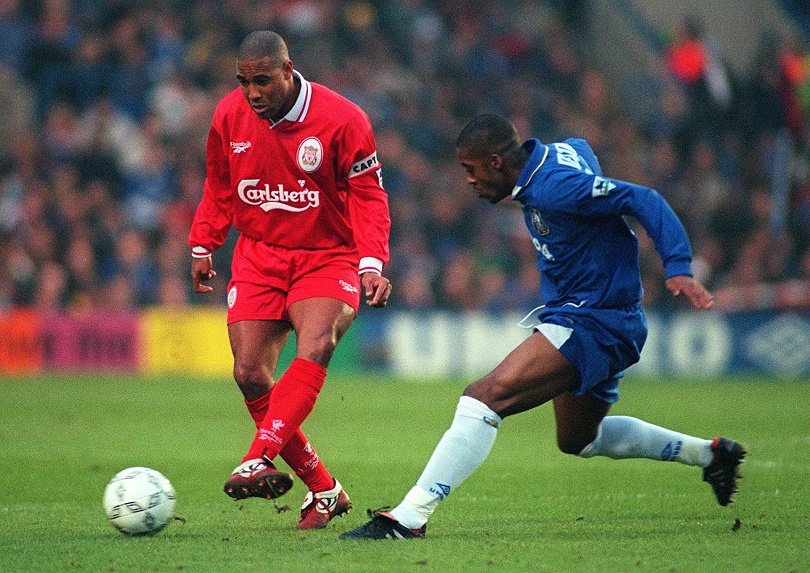
8. Sami Hyypia
His strengths, that combination of rugged defending and footballing ability, have become standard so quickly that his true value has been lost to time
Outside of Liverpool, Hyypia has been largely forgotten. That's peculiar, because he won almost everything there is to win in the game: a Champions League title, two Super Cups, a UEFA Cup, and two League and FA Cups apiece.
Stylistically, he was a transitional player. He was built like a debt collector, but that massive frame hid an impressive passing range and unlikely finesse, which are now prerequisites for centre-halves. It's possible, then, that the pace of that evolution has cost Hyypia his place at the legends’ table. His strengths, that combination of rugged defending and footballing ability, have become standard so quickly that his true value has been lost to time.
If so, that's unjust. He was virtually an ever-present in the Liverpool starting line-up between 1999 and 2006 and, while the league housed superior ball-players (Ferdinand, Campbell) and more technically proficient defenders (Terry, King, Henchoz), few offered such a broad range of abilities. He has those medals for a reason.
7. Michael Owen
There was always something breathless about watching him knife into the penalty box with that searing pace
When Owen’s prime is talked of, it's usually with reference to his goal in Saint-Etienne. Fine, but that shouldn't be allowed to dim the bright colours of his early Liverpool days.
Now, he's background noise on British television - yet another ex-professional collecting money for almost nothing. But then - before the TV, before the horses, and before his hamstrings snapped - he was the most exhilarating talent English football had seen in decades.
118 goals in 216 league appearances makes him list-worthy - only Gerrard and Fowler have scored more - but it's really his associated style which preserves his impact. Owen played in short, sharp bursts. He was an accomplished close-range finisher, of course, but there was always something breathless about watching him knife into the penalty box with that searing pace.
In subsequent years, Premier League audiences have been spoilt with dynamic players and have grown used to that kind of entertainment. During his time, though, there was nobody comparable to Owen - at least, nobody who combined a slight body shape with such a thrilling set of abilities.
He wasn't a complete player and was always too hologram-like to be embraceable, but it's often forgotten just how good he was and how watchable he could be. When the ball fell to him, you didn't blink.
6. Steve McManaman
His style of play was at odds with the local imperatives of power and graft and, in a Glenn Hoddle-like way, he was generally misused by the national team
Johan Cruyff once said, during McManaman's time in Spain, that the midfielder was a "friend to all players". It's a loose Spanish translation, but he meant that he was capable of combining with any type of footballer.
That's quite a compliment - and a pertinent one, too, given that McManaman is largely and incorrectly remembered as a frilly winger who hugged touchlines and attacked full-backs. He did those things, certainly, but that wasn't the extent of his game. In England, he suffered from an image problem: his style of play was at odds with the local imperatives of power and graft and, in a Glenn Hoddle-like way, he was generally misused by the national team and under-appreciated in his time.
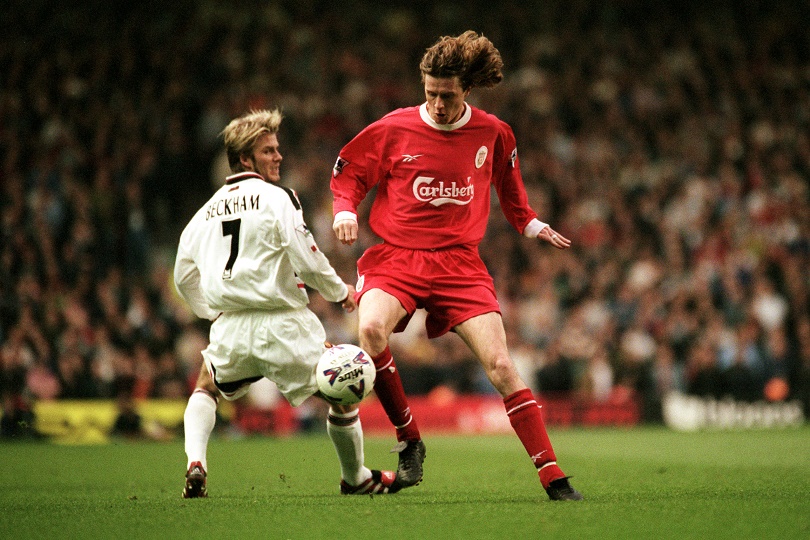
1990s Liverpool were an attacking side and, yes, there was an emphasis on McManaman's ability to beat defenders. But, unlike many of his contemporaries, his influence wasn't constrained to wide areas and he had the requisite vision to push through the centre of the pitch and ruffle a defence. Others produced the fireworks and McManaman probably didn't score enough goals, but he was one of the animating parts which made Liverpool one of the most fluid teams of that time.
5. Luis Suarez
Suarez was the club's most important player during a time when they came closer than ever before to becoming Premier League champions
Rarely has a player created as much trauma within defensive lines: Suarez's ability was so diverse and his movement was so good that he often panicked entire back fours into chaos.
2013/14 was his finest (31 goals in 33 appearances) and final season at Liverpool and, unfortunately, it's remembered for what that team failed to do rather than what it actually did. That's natural but unfair; challenging for the title was still a phenomenal overachievement and Suarez was, with respect to all the other players, the lead character.
Brendan Rodgers was a capable coach and his side was flecked with talent, but without Suarez they would never have troubled the title. His goal return might make that seem obvious, but his secondary and tertiary influence mattered more - it was that which allowed Daniel Sturridge to enjoy comfortably the best season of his career, Raheem Sterling to begin his ascent to stardom and Jordan Henderson to finally belong.
Suarez was the variable. Every team in the division tried to nullify him and every one of them failed; he ran wild all over the country, plundering as he went. It's a more remarkable achievement given how flawed Liverpool actually were: a limited goalkeeper, an unreliable defence and no natural holding midfielder.
And yet, on the strength of their attack - which was constructed entirely around Suarez's strengths - they were able to surge to within a fingertip of the trophy. His Liverpool career amounted to more than just that season, but those eight months provided the most vivid example of his importance. Suarez was the club's most important player during a time when they came closer than ever before to becoming Premier League champions: they were good, but he made them terrifying.
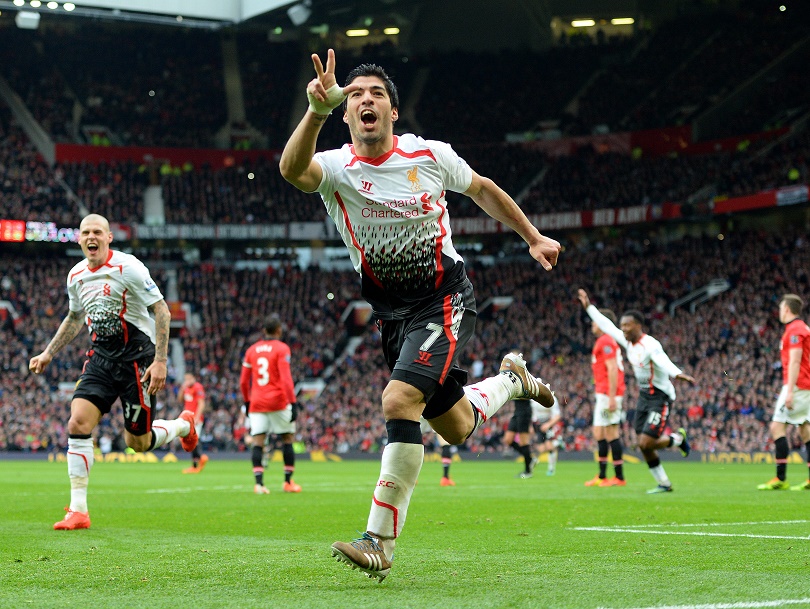
4. Xabi Alonso
A Champions League goal and medal in 2005 and a FA Cup win in 2006 gives it texture, but perhaps his finest hour came in Turin a month before that night in Istanbul
"I am still a Liverpool fan and will be forever, absolutely. Hopefully I can transmit to my son what Liverpool Football Club means and how special it is."
Alonso was infected by all the spirit that outsiders always seek to deny. That's rare in this age and rarer still in a foreign player with no prior attachment who spent just five years at Anfield.
But, lovely as it is, none of it would mean anything if Alonso's Liverpool career had no substance. A Champions League goal and medal in 2005 and a FA Cup win in 2006 gives it texture, but perhaps his finest hour came in Turin a month before that night in Istanbul.
Writing for the Guardian's live blog of that second-leg tie with Juventus, Barry Glendenning commented:
"Liverpool? In the semi-final? No disrespect to the Harry Kewell- Igor Biscan- and Djimi Traore-carrying Scouse outfit, but if that doesn't devalue the whole competition I don't know what does. How has a team this poor and injury-ravaged got this far?"
The answer was Alonso. He carried an injury into that game and was booked barely half-an-hour into it, yet the Spaniard still managed to be sensational in his defiance of a frontline which included Zlatan Ibrahimovic, Pavel Nedved and Alessandro Del Piero. And he did it alongside Igor Biscan and Antonio Nunez in a Steven Gerrard-less midfield.
Lists like these are rightfully home to goal-scorers and appearance record-holders, but they should make room too for era-defining moments: had Alonso not been as good as he was that night, there would have been no final, no comeback and no European Cup. He left other memories - none of them technically finer than his goal against Arsenal - but that quarter-final and that tournament run shone a deserved light on a player who often existed in Gerrard's shadow and was generally content to play his steady midfield percussion in the dark.
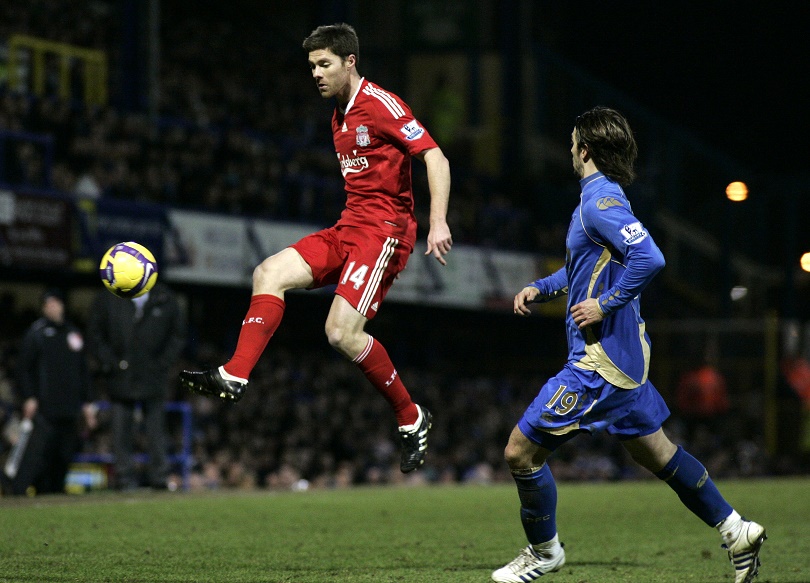
3. Jamie Carragher
Carragher was never particularly quick and he wasn't blessed with any perfect attributes, yet he still made more Premier League appearances than any other Liverpool player
Referring to a player as an "honest professional" is inadvertently offensive; it implies a lack of talent or certain limitations. For a long time, Carragher was pigeon-holed as a reactionary defender and the sort who specialised in last-ditch challenges and superficial “hero” moments - needless to say, that was grossly unfair.
His work at Sky Sports has shown what a sharp analytical mind he has but also, in retrospect, he's worth reappraisal due to his longevity. Carragher was never particularly quick and he wasn't blessed with any perfect attributes, yet he still made more Premier League appearances than any other Liverpool player.
That isn't a privilege afforded to someone because they're brave, tenacious, or because they speak with the right accent. Carragher may never have been among the division's very best, but he outlived almost all of his contemporaries at a time when the pace of the British game was accelerating. He was smart, savvy and able to play several defensive positions, while all the "try hard" platitudes with which he's lumbered were actually the gloss of his game rather than the foundation.
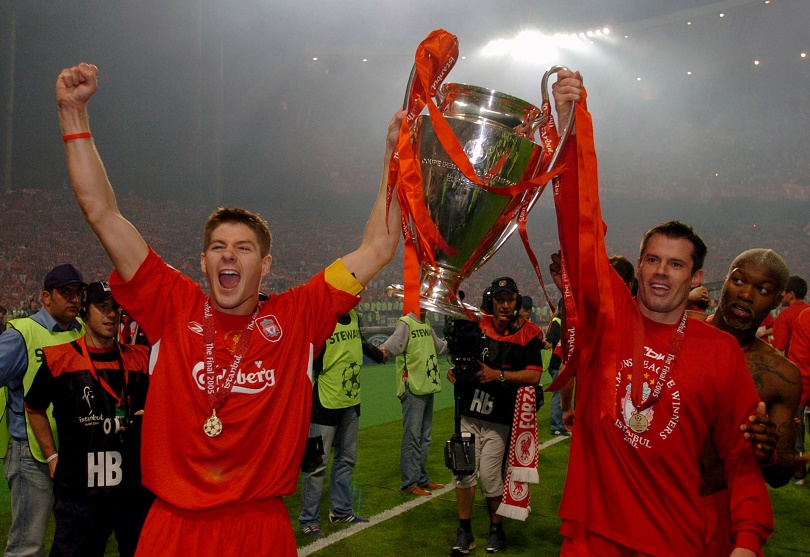
Carragher's worth is hard to quantify beyond the emotional symbolism, but after 508 appearances it's impossible to argue that he didn't belong entirely on merit.
2. Robbie Fowler
Born and raised in Toxteth, his excellence was often garnished with native cheek and, for the Liverpool public, that was an irresistible charm
Between August 1994 and May 1996, Fowler scored 53 league goals. He would never again reach 20 in a single season and only on four other occasions would he return double figures.
It's the asterisk that his career will always carry. It's a crying shame, too, because he was not only among the most natural finishers the league has ever seen, but also a rounded forward who was well ahead of his time.
In 2016, strikers are hybrid players who individually encompass traits which used to be shared across a partnership. Fowler, despite never being particularly quick or possessing any formidable physical qualities, was able to score every type of goal. He was as dangerous outside the box as he was in it and had a left-foot which could both open tins and kick a grape through a brick wall. Fowler was a complete forward before such a concept existed.
He had a spirit to him, too. Born and raised in Toxteth, his excellence was often garnished with native cheek and, for the Liverpool public, that was an irresistible charm. His decline and departure coincided with Steven Gerrard's rise, but while Gerrard remains the quintessential modern hero and enjoys the freedom of Merseyside, Fowler was loved in a different way. He was roguish, impudent and human, sometimes bearing his social conscience and flaunting football's laws inside the same 90 minutes.
It's a tale of semi-tragedy: had his legs not buckled, he would surely have kissed the sky. But somehow, in spite of his body failing him, he burns almost as brightly today as he did 20 years ago.
1. Steven Gerrard
The ink has dried and the quill has been tossed away; everything that could be written already has been. Gerrard became a Liverpool immortal many years ago.
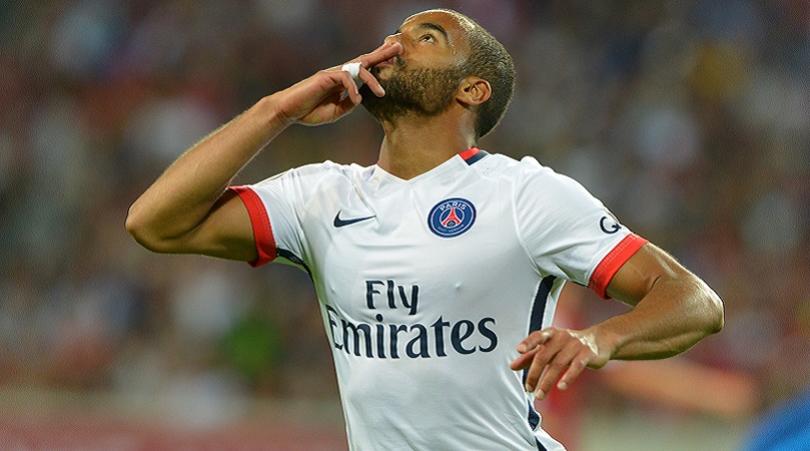
10 players who Liverpool could realistically sign in January
A unique record in finals and the Merseyside derby master - Gerrard's career in Opta numbers
The miracle of Istanbul to the costliest of slips - Gerrard's highs and lows
His thunderous equaliser in Cardiff, his searing half-volley against Olympiakos and his performance in Istanbul are moments and images which, even across generations, will never fade. For as long as the ground exists, supporters will be able to look down on the Anfield pitch and see Gerrard's ghost - they'll see the celebrations, the driving runs, the goals and, as if it all happened yesterday, remember exactly where they were and how they felt at the time.
That's what greatness is: permanence. There used to be a theory that, without a league title, Gerrard's body of work would be incomplete. That's been proven incorrect. Mix his abilities with childhood fandom and those regrettable ties to Hillsborough, add in a European Cup and dozens of moments which belong inside gilded frames, and the result is something impermeable.
Gerrard was an excellent player, but his talent and success was also tethered to his community at a time when football was breaking loose of its societal moorings. It made him a paradox: simultaneously anachronistic and timeless. Cast the bronze, make the statue.
Seb Stafford-Bloor is a football writer at Tifo Football and member of the Football Writers' Association. He was formerly a regularly columnist for the FourFourTwo website, covering all aspects of the game, including tactical analysis, reaction pieces, longer-term trends and critiquing the increasingly shady business of football's financial side and authorities' decision-making.
